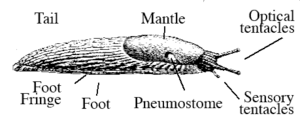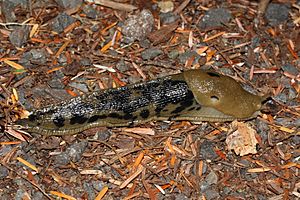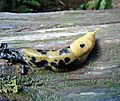Banana slug facts for kids
Quick facts for kids Banana slug |
|
|---|---|
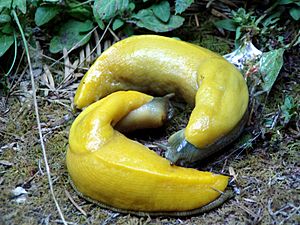 |
|
| Two banana slugs preparing to mate | |
| Scientific classification |
|
| Kingdom: | Animalia |
| Phylum: | Mollusca |
| Class: | Gastropoda |
| Subclass: | Heterobranchia |
| Clade: | Euthyneura |
| Order: | Panpulmonata |
| Clade: | Eupulmonata |
| Clade: | Stylommatophora |
| Superfamily: | Arionoidea |
| Family: | Ariolimacidae |
| Subfamily: | Ariolimacinae |
| Genus: | Ariolimax Mörch, 1859 |
| Type species | |
| Ariolimax columbianus |
|
| Synonyms | |
|
Aphallarion Pilsbry & Vanatta, 1896 |
|
Banana slugs (Ariolimax) are a type of slug found in North America. They belong to a group of animals called gastropods.
These slugs are often bright yellow, which is how they got their "banana" name! But they can also be green, brown, tan, or even white.
Contents
What are Banana Slugs?
Banana slugs are a group of land slugs found in North America. There are different kinds, or species, of banana slugs. Some of the well-known species include:
- Ariolimax buttoni (Button's Banana Slug)
- Ariolimax californicus californicus (California Banana Slug)
- Ariolimax columbianus (Pacific Banana Slug)
- Ariolimax dolichophallus (Slender Banana Slug)
- Ariolimax stramineus (Southern Pacific Banana Slug)
The Pacific banana slug often has black spots. Sometimes, these spots are so big that the slug looks almost completely black! Their color can change depending on what they eat, how much light they get, and how much moisture is around. Their color can also show if they are healthy or how old they are.
How Big Are They?
The Pacific banana slug is the second-largest land slug in the world. It can grow up to 25 centimeters (about 10 inches) long! It can also weigh around 115 grams (about 4 ounces). The largest slug is found in Europe and can be 30 centimeters long.
Banana slugs usually live for about 1 to 7 years. They move quite slowly, about 6.5 inches (16.5 cm) per minute.
Slugs use two pairs of tentacles to feel their way around. The longer top pair helps them see light and movement. The shorter bottom pair helps them smell chemicals. They can pull their tentacles back if they are in danger. If a predator bites off a tentacle, the slug can even grow a new one!
Where Do They Live?
The Pacific banana slug mostly lives in the damp forest floors along the Pacific coast of North America. This area stretches from Alaska down to California.
You can also find smaller groups of them in other places. These include parts of British Columbia in Canada and some mountain areas in California. These slugs like places that are cool and moist, especially near creeks and wet areas.
What Do They Eat?
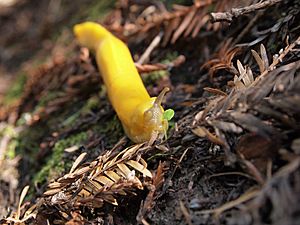
Banana slugs are like nature's cleanup crew! They are called detritivores, which means they eat dead plants and animal droppings. They help turn these materials into rich soil.
They eat many different things, but they especially like mushrooms. When they eat, they also help spread seeds and spores. This helps new plants grow. Their droppings are also full of nitrogen, which is good for the soil. By eating dead stuff, banana slugs help keep the ecosystem healthy.
Some animals like raccoons, garter snakes, ducks, geese, and salamanders sometimes eat banana slugs. They often roll the slugs in dirt to get rid of the slime. Young banana slugs might be eaten by moles or shrews.
Amazing Slime!
Banana slugs make a lot of slime! This slime helps them move easily across the ground. It also protects them from predators and tiny germs.
The slime is very special. It can absorb a lot of water, up to 100 times its own size! It's not quite a liquid or a solid, but something in between. The slime also helps the slug breathe through its skin by keeping it moist.
Interestingly, the slime also contains chemicals that can make a predator's tongue feel numb! This is a good way for the slug to protect itself. The bright yellow color of some slugs might also be a warning sign to predators that they might not taste good.
How Do They Reproduce?
Banana slugs are hermaphroditic. This means each slug has both male and female reproductive parts. Because of this, they can mate with any other banana slug. They can even fertilize their own eggs, though they usually mate with another slug.
When slugs are ready to mate, they release special chemicals called pheromones in their slime trails. These pheromones help them find other slugs to mate with.
After mating, the slugs find a safe, hidden spot to lay their eggs. A slug can lay anywhere from 3 to 50 clear, jelly-like eggs in a small crack or under leaves. The eggs usually hatch in one or two months. The baby slugs are often pale white at first, then they get their famous yellow color as they grow. The adult slugs do not take care of their eggs after they are laid.
Banana Slugs in Culture
The banana slug is famous for being the mascot of the University of California, Santa Cruz. The students chose the banana slug as their mascot, and it's very popular in the local forests around the campus. The city of Santa Cruz even declared September 27th as the official "Day of the UC Santa Cruz Banana Slug."
Long ago, some Native American groups and German immigrants used to eat banana slugs. However, today, most people don't find them very tasty!
Images for kids
See also
 In Spanish: Ariolimax para niños
In Spanish: Ariolimax para niños


